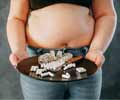According to research, even minor weight loss is associated with worse health outcomes among patients implanted with a certain type of defibrillator.

"In patients with heart failure who receive a cardiac resynchronization device with defibrillator, unintended weight loss of just five pounds increases the risk of a serious cardiac event," said Valentina Kutyifa, MD, postdoctoral research associate at the University of Rochester Medical Center and the lead author of the Multicenter Automatic Defibrillator Implantation with Cardiac Resynchronization Therapy (MADIT-CRT) trial. "These findings suggest clinicians should be monitoring patients with unplanned weight loss more closely."
Among the subset of patients who had a specific heart condition called a left bundle branch block, the risk of heart failure or death with weight loss doubled. CRT-D devices work by emitting small electronic impulses to coordinate the heart's rhythm and improve the ability of the heart to pump blood in patients with heart failure, and by attempting to shock the heart back into a normal rhythm when dangerous heart rhythms are detected. CRT-Ds comprise one-third of all pacemakers.
In this study, nearly 1,000 patients who received a CRT-D were observed at 12 months after implantation. Of these, nearly one in five (17 percent) had lost more than 2 kilograms, or 4.4 pounds, during that time. These patients had a significant increase in their risk of heart failure or death compared to those without significant weight loss. In fact, each kilogram (2.2 pounds) of weight lost correlated to a 4 percent higher risk of heart failure or death.
This study fits with other studies that have looked at the "obesity paradox," wherein overweight patients with chronic diseases such as heart disease, kidney disease or diabetes, have better health outcomes than those of normal weight. One reason for this paradox among CRT-D patients might be that heart failure causes the body to be in a catabolic state, meaning it has a high demand for energy. Heart failure patients without significant weight loss may have reserves that better allow their bodies to tolerate this high energy demand, Dr. Kutyifa said.
Study authors caution that their findings are not a prescription for patients to pack on the pounds.
Advertisement
According to Dr. Kutyifa, more research is needed to examine the effects of weight loss among heart failure patients with pacemakers in prospective clinical trials. The MADIT-CRT trial was supported by a research grant from Boston Scientific, St. Paul, Minn.
Advertisement















